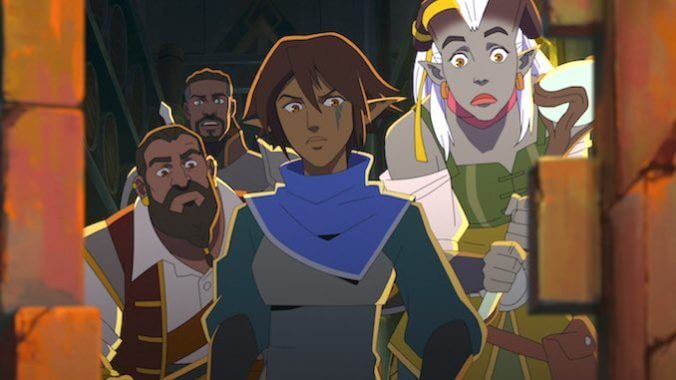What Dragon Age: Absolution Reveals About DA4: Dreadwolf’s World State
Photo Courtesy of Netflix

While all Dragon Age players have their own canon world state (my Hero of Ferelden sacrificed herself to end the Blight, and I stand by this as the canon ending of DA:O!), it’s clear from the Dragon Age supplemental stories, such as Tevinter Nights and, now, Dragon Age: Absolution, that the developers also have an idea of what is canon. Watching Absolution gives plenty of clues on what the developers think players did in Dragon Age: Inquisition. Check out these Easter Eggs from the animated miniseries to find out how your world state matches the default Dreadwolf starting world—and what you did differently.
As noted above, there are spoilers below for both the Dragon Age games and the Netflix series Absolution.
![]()
Being an Elf Sucks
This may seem too obvious to bear repeating, but it really, really sucks to be an elf in Thedas. The plot reveals of Dragon Age: Inquisition show that while Solas/Fen’Harel may not consider himself closely related to modern elves, he’s willing to destroy the whole world to improve their lot. Or to undo the damage of the Fade. But mostly to take down everyone but the elves. While in the games, players get to see how awful it is to live in an Alienage, or how much self-hatred comes out of being raised to look down on your own people (looking at you, Sera), watching Absolution’s hero, Miri, deal with the wreckage just being an elf in Tevinter made of her life really illuminates how awful Thedas is for elves.
From the get-go, while Miri has her close friends (and has the respect of a gang of thieves over their own boss), it’s obvious people hold being an elf against her. This only gets worse when she and the Absolution team go to Tevinter to return to her old stomping grounds. She was enslaved by a family of magisters, raised with her brother to be an assassin and bodyguard to Rezaren Ammosine, who is potentially in line to become Tevinter’s next Divine. But while she had a certain status due to the political status of the Ammosines, she and her brother were always treated as disposable—and, indeed, her brother was sacrificed by Rezaren’s mother without a second thought so that Rezaren could succeed. Miri’s relationship with Rezaren, and her desire for freedom and agency, are shaped by what it means to be an elf in Thedas. (For Dalish Inquisitor players, there’s a real feeling of payoff in watching Miri, knowing that you, too, faced that same prejudice and triumphed anyway.)
Fairbanks
In Inquisition, the Inquisitor has a chance to choose the fate of Fairbanks, a noble who has become a freedom fighter in the Dales. In Absolution, Fairbanks returns, clearly having been recruited by the Inquisition, as he’s working on one last mission for the cause. The implication, by the way he wears a signet ring and pays all the expenses for the heist, is that the Inquisitor chose to out Fairbanks as a noble—but that generally, life has gone well for him in the meantime, and he’s gotten married to a wife who pokes fun at him, but whom he loves.
It’s a shame, then, that his tenure in Absolution is so short. In the second episode, he attacks Hira, the Inquisition mage he partnered with to retrieve a magical artifact, and she fights back, dealing a mortal blow. The narrative plays with the idea that Fairbanks has been a traitor all along, which just doesn’t gel with the way the character was developed in Inquisition. When it turns out that Fairbanks wasn’t ever the real traitor, it makes more sense in world (even though it’s a devastating turn for Miri).
Herald of Andraste/The Fate of the Inquisition
-

-

-

-

-

-

-

-

-

-

-

-

-

-

-

-

-

-

-

-

-

-

-

-

-

-

-

-

-

-

-

-

-

-

-

-

-

-

-

-








































